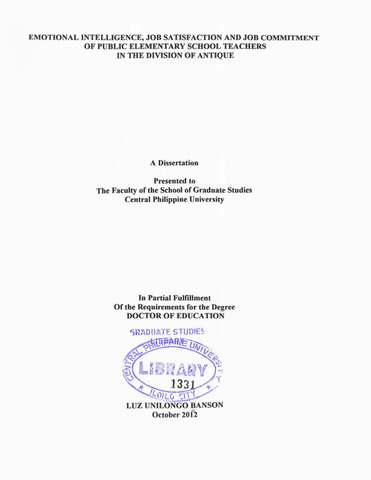Emotional intelligence, job satisfaction and job commitment of public elementary school teachers in the division of Antique

Page views
1,091Date
2012Author
Thesis Adviser
Defense Panel Chair
Share
Metadata
Show full item record
Abstract
This study was conducted to determine the level of emotional intelligence satisfaction and job commitment of public elementary school teachers in the Division of Antique. Specifically the study sought to determine the profile of the elementary school teachers according to sex, age, civil status, teaching position, educational attainment and length of service and if those personal and work related characteristics are related to the teachers’ emotional intelligence satisfaction and job commitment. The teachers’ emotional intelligence was examined in terms of five sub-skills namely: emotional awareness, managing one’s emotions, self-motivation, empathy and coaching other's emotions.
In consonance with the objectives of the study, it was hypothesized that sex, age, civil status, teaching position, educational attainment and length of service are significantly related to the level of emotional intelligence, job satisfaction and job commitment of the teachers. It was also predicted that emotional intelligence is significantly related to job satisfaction job satisfaction is significantly associated with job commitment and job commitment is significantly related with emotional intelligence.
This study made use of the descriptive-relational method with one-shot survey design. The respondents of the study were 333 public elementary school teachers in the Division of Antique. They were selected using multi-stage sampling procedure. The research instruments used were Dr. Nicholas Hall’s Emotional Intelligence Self Evaluation, Job Satisfaction Questionnaire retrieved from internet and Job Commitment Questionnaire constructed by Delicana. The statistical tools used were the frequency counts, percentage, mean, Chi-square, Gamma and Cramer’s V.
Majority of the respondents of this study were female, 40 to 49 years old, married, Teacher I in position, graduates of education courses and with 6 to 19 years experience in teaching.
The findings disclosed that in general, the teachers had an average emotional intelligence therefore they need some development. It was only between teachers’ age and self-motivation skill that relationship was found to be significant. Teaching position and educational attainment were also found to be significantly related with one sub-skill which is coaching other’s emotions. All other factors were not significantly related with the other four areas of emotional intelligence.
The teachers as a whole group, were satisfied with their job, with the highest proportion in satisfied with their work while the lowest, satisfied with facilities and working environment. A great majority of the teachers were satisfied with their job as teachers. Moreover, there was significant association between teaching position and job satisfaction among the elementary school teachers. Age, sex, civil status, educational attainment and length of service were not significantly related to job satisfaction.
In general, the majority of the teachers were highly and moderately committed to their job as teachers and only one respondent manifested low commitment. Sex and length of service were found to be significantly related with job commitment. The other personal and work-related characteristics of the teachers had no significant bearing on their job commitment.
A significant association was found between the respondents’ job satisfaction and their job commitment. Only one dissatisfied teacher had low commitment.
The findings further disclosed that a significant relationship between the teachers’ level of emotional intelligence and job commitment, and so with job satisfaction and job commitment. This study failed to establish a significant association between emotional intelligence and job satisfaction.
Based on the findings and conclusions presented, the following recommendations are offered:
There is a need to develop and enhance teachers’ emotional intelligence in terms of emotional awareness, managing one’s emotion, self-motivation, empathy and managing other’s emotions by providing trainings and seminars.
The efforts and commitment of the teachers who have “high commitment” level maybe acknowledged through a comprehensive merit reward system in order to encourage more teachers to serve to the utmost. Moreover, these teachers should be emulated and should serve as models to other teachers.
The school should provide opportunity or avenue for professional growth or career development for the teachers.
The competence and commitment of the female teachers should be sustained and
the male teachers should be given special programs (scholarship, benefits, and the like) moral support and encouragement to help them become more competent in their teaching profession, hence high commitment can be maintained or maximized.
Schools should provide interventions or incentives to enhance and encourage more teachers’ job satisfaction and sustain commitment.
Lastly, it is further recommended that other related studies involving emotional intelligence be explored in other areas of educational concerns in different groups of respondents for a wider and deeper understanding of its significance in job satisfaction, work ethics, job performance and job commitment in any workplace in any organization relative to education.
Description
Abstract only
Suggested Citation
Banson, L. U. (2012). Emotional intelligence, job satisfaction and job commitment of public elementary school teachers in the division of Antique (Unpublished doctoral dissertation). Central Philippine University, Jaro, Iloilo City.
Type
DissertationSubject(s)
Keywords
Department
School of Graduate StudiesDegree
Doctor of EducationShelf Location
GSL Theses 378.242 B227
Physical Description
x, 154 leaves
Collections
- Doctor of Education [18]


